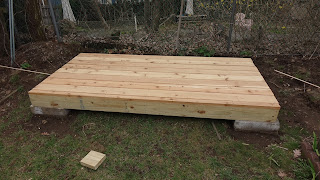Reservations made six moths ago, stressing the weather report for a week, anxious about traffic, I made my way to Lake Placid. Drive up was easy, good weather, but not without surprises. North of Albany, exits were fairly routine as far as amenities were concerned, but the further north I went, the less there was. The exit sign promised a knife & fork, but it consisted of a Stewart's Shop-ugh!-a notch of two below Henny Penny.
I detoured to Lake George Village in search of lunch. I didn't really find any (lots of stuff was seasonally closed), but I'm glad I saw this place! It was like a 50's resort well maintained and preserved, from the pre-interstate era when it was more of a "destination".I left I-87 at Rt. 73. I was immediately amazed by the scenic beauty of the road: now I was well into The Adirondacks. 73 is a winding valley road, and frequently marked with signs for roadside parking and trailheads. I also got a great sub at a local deli.
Real mountains began to appear, prominent and "otherly". The mountain at left was frequently visible from the entire area. Later in the day, I talked to some local dudes who were photographing by the roadside, and they said that the denuded areas were from rockslides.These Adirondacks had a different quality to my familiar Greens of Vermont and Whites of New Hampshire. The Greens are rounder and forested, a comfy Middle-Earth feeling. The Whites are like bold, solid sculptures of granite. These are tough, scarred, steep mountains, snow-capped in April, and a little intimidating, seemingly able to drop a boulder on you at random as you drive by.
Lake Placid preserves infrastructure from the 1980 Olympics, almost like the remnants of the 1964 World's Fair in Queens, but in better repair. I don't know if these ski jumps are still used, but I was amazed at how close to the road they were. Obviously impossible, but it looks like a jumper could land on the road! Similarly, the Speed Skating Oval is located directly on Main St, in front of the High School. In 1980, on T.V, these things looked remote and huge.My digs in LP were pretty good & convenient. There was a good deal of car and foot traffic, but nothing overwhelming. Dinner was frustrating-prices were outrageous, and they tended to stop serving food at 9:00, on that of all nights!
Monday morning after paying outrageous prices for gas and breakfast, I did some driving around.
Whiteface Mountain ski area. Few cars in the parking lot at 7:30, and the lot isn't that huge. At center, you can see rockslide areas, which are sometimes actually open for skiing.This helped me figure something out about the area. While historic, this place just isn't a really hot ski destination. Much further to drive than Hunter, Gore, and West mountains, and I read reports of frequently windblown and icy conditions. For all that driving, it would be easier to go to Stowe, Killington, or other Vermont destinations. What makes a mountain fine for racing doesn't make it fine for recreation. It also goes the other way-Park City Utah's unpredictable frequent dumps of powder make it a recreational dream, but a racing problem.
I was advised by a Local to gas up/food up and Get Out Of Dodge in the direction of the highway well before the 2:15 onset. After looking at a few spots, I settled in at a local Park in Keene, partway back to the highway. Nice spot! In fact I was somewhat relieved that the eclipse viewing was less commercialized than it might have been. Parking was free, though limited, and they even had a small lot reserved for Low Physical Mobility viewers. Abundant free viewing glasses. Kudos to the town of Keene!
It was two hours early, and I'm not that good at waiting. Made the acquaintance of my parking neighbors, a nice couple from Maryland, and walked around the field a lot. The field was large, and the small number of people spread out comfortably. It was mainly a Family Crowd, and the younger groups were well behaved, no loud music or smell of pot.
The first chip! Stressing about the photo technique, but it turned out fine.
There was a very thin layer of cirrus clouds which didn't affect viewing, but I think it drove my autofocus nuts. Every photo took several tries to get the camera to take the picture in focus.Oddly, with half the Sun covered, you wouldn't have noticed anything weird without observing through glasses.At this point, it was getting a little strange, but still nothing you would have noticed.
Totality! It seemed to happen fast-one minute it was "just kinda dark", then it was indescribable! People cheered. You couldn't help it. You could look directly at it, and I removed my sun filter, and blazed away, thrilled with the quality of the images. Also the temperature dropped a good twenty degrees. I wonder how the Flat-Earth Conspiracy Theorists explain this?I didn't get a good photo of the "Diamond Ring Effect". It happened very fast, and I couldn't get my sun filter back on in time.
I hung out long enough to get this "back out" photo.My plan was to leave shortly after the Totality, and beat the traffic. It turned out to be "everybody else's" plan as well. Drive home was tough, averaging 22 mph all the way to Lake George, where it finally eased up. Small price to pay for the experience of a lifetime!





















































